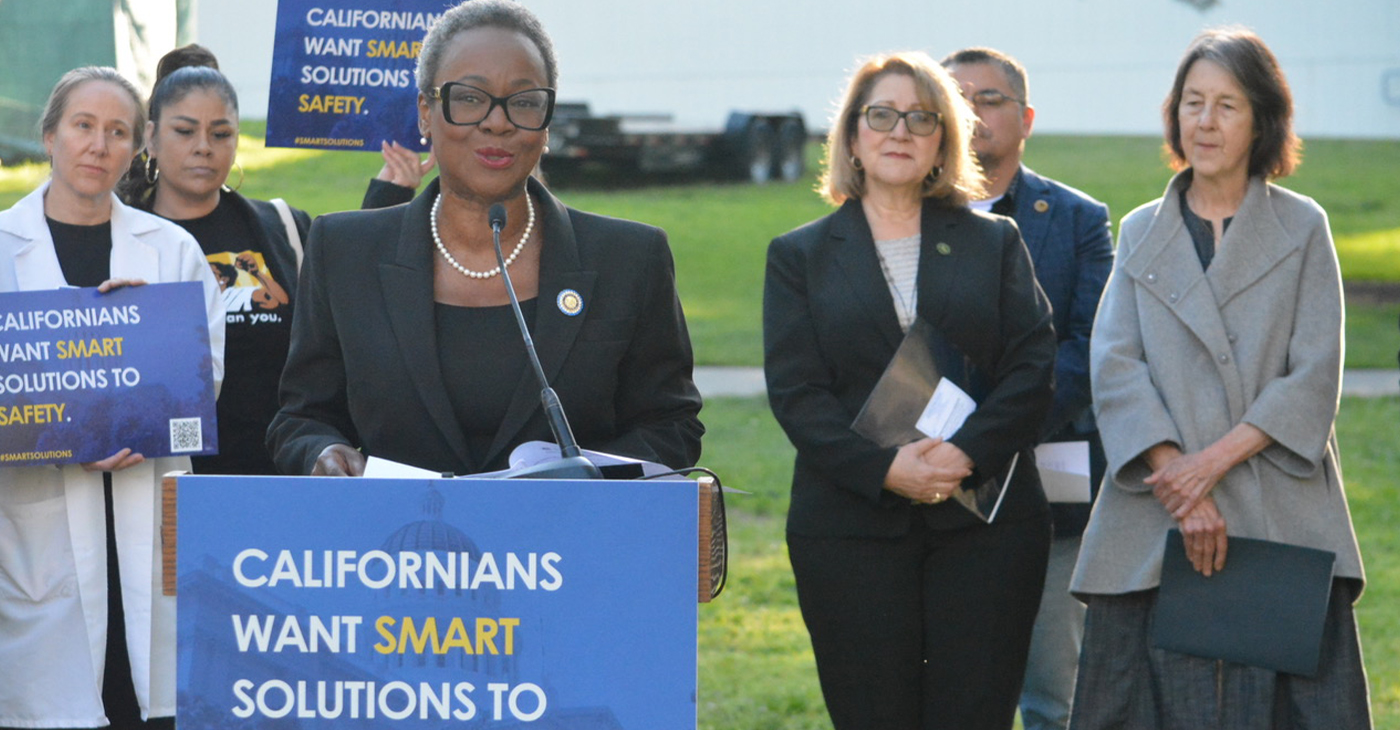Health
Medi-Cal Now Covers Long Term Illnesses
By Manny Otiko, California Black Media
In 1998, San Pedro resident Alaina Howard was diagnosed with Takayasu’s arteritis, a disease that narrows and obstructs the arteries.
Her doctors gave her two years to live. Faced with the difficulty of accepting her diagnosis, Howard also had to deal with frequent fainting spells, caused by the limited flow of blood to her brain.
Seventeen years later, Howard has beaten the odds and is still alive, but she had to go on disability.
Unable to work, Howard — a Pennsylvania resident at the time — was forced to apply for public aid. During that process, she learned her status also qualified her for health insurance through Medicaid.
In 2007, she moved from Pennsylvania to California and enrolled in Medi-Cal, the state’s health insurance program for low-income individuals or families.
Howard says Medi-Cal has been invaluable for maintaining her health, even though she faced a few challenges along the way — like the long lines at her county human services agency. She says the wait was well worth it, though, when she is faced with huge medical bills from frequent hospital visits.
Not being on the hook with collection agencies for bills she cannot afford for services she needs to control her chronic illness, is the best part of the coverage, says Howard.
And even though she still has to pay some out-of-pocket medical expenses for her two children, she can’t imagine what her life would be like without her Medi-Cal coverage.
In addition to providing health care for people with chronic illnesses like Howard, Medi-Cal offers a variety of preventive health care programs, according to Adam Weintraub, a spokesman for the California Department of Health Care Services (DHCS.)
The state’s government-funded health coverage program, which has historically focused on services to children and families, has now expanded to include single men and women without children and disabilities who qualify based on their annual income.
To be eligible, an individual would have to earn less than $16,105 every year or $32,913 for a family of four.
“Medi-Cal provides Californians with access to affordable, high-quality health care, including medical, dental, mental health, substance use disorder treatment services, and long-term care,” Weintraub said.
“Among the programs administered by DHCS are: California Children’s Services; Child Health and Disability Prevention program; the Genetically Handicapped Persons Program; the Newborn Hearing Screening Program; the Family Planning, Access, Care, and Treatment Program (PACT); Program of All-Inclusive Care for the Elderly (PACE); Every Woman Counts; and Coordinated Care Management. DHCS also administers programs for underserved Californians, including farm workers and American Indian communities.”
California is also working to expand the number of people with access to health care through Covered California, a marketplace where individuals whose incomes exceed the threshold to qualify for Medi-Cal can access private health insurance, potentially with financial assistance.
Covered California is part of the federal Patient Protection and Affordable Care Act commonly called “Obamacare” and partners with the California Department of Health Care Services, to provide affordable, health coverage options to Californians.
On the Covered California website, Weintraub says, individuals can find out if they qualify for low-cost, private health insurance or Medi-Cal.
“New enrollment for 2015 coverage is strong and has brought in consumers our marketing and outreach targeted,” said Covered California Executive Director Peter V. Lee. “It is clear Latinos, African Americans and young adults not only heard, but acted on increased advertising and person-to-person outreach.”
To apply for for Medi-Cal, sign up year-round online or by mail. Enroll in person at a local human services agency.
For information about Medi-Cal enrollment, visit www.dhcs.ca.gov/services/medi-cal/pages/applyformedi-cal.aspx
Visit Covered California’s website at www.coveredca.com or call 1-800-300-1506.
This article was produced by California Black Media, a coalition of Black -owned media outlets.
Antonio Ray Harvey
Sacramento Lawmakers Step Up Push for “Smart Solutions” on Crime, Public Safety
Assemblymember Tina McKinnor (D-Inglewood) and Sen. Lola Smallwood-Cuevas (D-Ladera Heights), both members of the California Legislative Black Caucus (CLBC), have joined other lawmakers and criminal justice reform advocates to address public safety in the state. On April 2, CLBC members gathered outside the State Capitol for the unveiling of the #SmartSolutions Public Safety Policy Platform, a package of 30 bills that addresses the top concerns of retailers, retail workers, the fentanyl crisis, and support for victims and survivors of crime.

By Antonio Ray Harvey, California Black Media
Assemblymember Tina McKinnor (D-Inglewood) and Sen. Lola Smallwood-Cuevas (D-Ladera Heights), both members of the California Legislative Black Caucus (CLBC), have joined other lawmakers and criminal justice reform advocates to address public safety in the state.
On April 2, CLBC members gathered outside the State Capitol for the unveiling of the #SmartSolutions Public Safety Policy Platform, a package of 30 bills that addresses the top concerns of retailers, retail workers, the fentanyl crisis, and support for victims and survivors of crime.
“Instead of being tough on crime, we need to be smart on crime,” Smallwood said at the press briefing. “I am not saying that we’re not going to be holding folks accountable for the actions that they take. But we will not rely on incarceration as a solution.”
McKinnor, Smallwood-Cuevas, a coalition of advocates, addiction treatment experts, and Yurok Tribal leaders joined Sen. Nancy Skinner (D-Berkeley), and Assemblymember Eloise Gómez Reyes (D-Colton) at the press conference organized to promote legislative solutions that ensure safety and justice.
Organizers say #SmartSolutions is an intersectional campaign that combats criminalization and mass incarceration by pushing for the redirection of state resources to fund housing, health care, schools, services for victims, and programs that reduce recidivism and promote accountability, beyond incarceration.
Opponents of the bills proposed in the #SmartSolutions campaign say their colleagues who support reform-focused strategies are looking the other way on crime and encouraging lawlessness.
For example, Assemblymembers Wendy Carillo (D-Boyle Heights), Carlos Villapudua (D-Stockton) and Mike Gipson (D-Carson) are supporting Assembly Bill (AB) 1990, legislation that would allow a peace officer to arrest shoplifters without a warrant or without witnessing the theft.
Assemblymember James Ramos (D-Highland) authored AB 1772 and introduced it in January. The legislation proposes sterner penalties for retail theft, particularly for repeat offenders.
The #SmartSolutions campaign is co-sponsored by Ella Baker Center for Human Rights, Smart Justice California, American Civil Liberties Union (ACLU) California Action, Californians for Safety and Justice, and Californians United for a Responsible Budget (CURB).
Smallwood recently introduced two bills she hopes will provide solutions to the escalating retail theft problem in the state. Senate Bill (SB) 1446 addresses theft, technology and job security in retail establishments and aims to minimize workplace violence, according to supporters. SB 1282 requires counties to expand the use of a diversion program for theft cases.
“Restorative Justice is the essential pillar of making our criminal justice system more fair, just, and equitable,” McKinnor said. “Restorative justice recognizes the trauma of victims and preparatory of crimes and provides a constructive space for victims to find healing.”
Dr. Amiee Moulin, founder of the California Bridge program and chief of the Division of Addiction Medicine at the University of California (UC) Medical Center, said drug “addiction and overdose” are taking a toll on patients, families and the community.
“I believe that California’s proposed legislation focused on expanding access to treatment is a crucial step towards saving lives,” Moulin said. “By removing barriers to care and embracing evidenced-based strategies we can provide patients the support they need to heal and recover.”
California Black Media
Stakeholders Warn Lawmakers of Expanding Aging Population; Older Black Californians Included
The California Commission on Aging (CCoA) hosted its second annual forum focused on challenges facing Californians over 65 years old. Titled “Aging and Disability Issues: What Legislative Staff Need to Know for 2024,” the virtual event was organized to bring awareness to lawmakers that California’s aging adults are living longer and to emphasize the importance of developing policy to support this growing population, according to organizers.

By Antonio Ray Harvey, California Black Media
The California Commission on Aging (CCoA) hosted its second annual forum focused on challenges facing Californians over 65 years old.
Titled “Aging and Disability Issues: What Legislative Staff Need to Know for 2024,” the virtual event was organized to bring awareness to lawmakers that California’s aging adults are living longer and to emphasize the importance of developing policy to support this growing population, according to organizers.
This year’s meeting included the perspectives of gerontologists and other subject-matter experts who provided data and insights critical to informing policy.
Former Assemblymember Cheryl Brown (D-San Bernardino), who chairs the CCoA’s Executive Committee, began the discussion.
“The landscape of California is changing. Aging is changing and it’s changing California,” Brown said. “Older adults are living longer, and the cohort is becoming more ethnically diverse, underscoring the need to develop culturally, appropriate services.”
The discussion encompassed a range of topics including planning for long-term care, assisted living, enhancing healthcare quality, technology use, services for senior adults with disabilities, state budget considerations, and the best policies and practices to help aging adults stay healthy, active, independent, and confident.
The CCoA acts as the principal advocate for older Californians and as a catalyst for change that supports and celebrates Californians as they advance in age. The CCoA advises the Governor and Legislature, along with state, federal, and local agencies on programs and services that affect senior adults.
Statewide organizations that participated in the event included LeadingAge California, Disability Rights California, California Foundation for Independent Living Centers, and California Collaborative for Long-Term Services and Supports.
In addition, representatives and staff members of Choice In Aging, Age Watch Newsletter, California Elder Justice Coalition, California Association of Area Agencies on Aging, and the California Long-Term Care Ombudsman Association were presenters during the 90-minute discussion.
“In California, we know that older adults are underserved and unserved relative to their needs,” CCoA Executive Director Karol Swartzlander said. “In stark terms, we know that 4% of older adults who need service actually receive services.”
According to the California Department of Aging (CDA), California’s aging population is expected to reach an estimated 4.5 million individuals ages 60 to 69 and 4.2 million senior adults ages 70- to 79 by the year 2040, based on information from CDA’s Master Plan for Aging.
Recognizing that the state’s 65-plus population is projected to grow to 8.6 million by 2030, Gov. Gavin Newsom issued an executive order calling for the development of the MPA.
Debbie Toth, from ChoiceInAging, said the MPA is a model of “how we can do better” to service the needs of older adults. ChoiceInAging, Toth said, “is going to be shopping accessible transportation and rate increases for adult day healthcare.
“But we need to have legislation to do it,” Toth told legislative staff members.
A 2016 California Health Report (CHR) revealed that by 2030, 18% of the state will be 65 or older. Projections in that study also indicated that 52% of these older adults would be from diverse minority groups but “no population is expected to be harder hit than African Americans,” the report stated.
California Black Media
Asm. Akilah Weber Introduces Bill to Protect Terminally Ill Californians
On Feb. 7, Assemblymember Akilah Weber (D-La Mesa) introduced legislation, Assembly Bill (AB) 2180, designed to ensure that terminally or chronically ill people living in California can afford their life-saving medications.
If passed, the law would require California health plan providers, insurers and pharmacy benefit managers (PBMs) to count the value of financial assistance provided by subsidy programs towards a terminally ill patient’s deductible and out-of-pocket expenses.

By California Black Media
On Feb. 7, Assemblymember Akilah Weber (D-La Mesa) introduced legislation, Assembly Bill (AB) 2180, designed to ensure that terminally or chronically ill people living in California can afford their life-saving medications.
If passed, the law would require California health plan providers, insurers and pharmacy benefit managers (PBMs) to count the value of financial assistance provided by subsidy programs towards a terminally ill patient’s deductible and out-of-pocket expenses.
“When insurers and PBMs do onto count the value of copay assistance toward cost-sharing requirements, patients often experience “a copay surprise” at the pharmacy counter and may be forced to walk away without their needed medication because they cannot afford it,” wrote Weber in a statement.
Over 80 patient advocacy organizations, medical foundations and other groups applauded Weber for introducing the legislation.
“The All Copays Count in California Coalition commends Dr. Weber for championing legislation that will improve patient access to medications and protect the most vulnerable Californians from harmful and deceptive insurance schemes that raise patient costs,” said Lynne Kinst, Executive Director of Hemophilia Council of California (HCC), which is a cosponsor of the bill.
According to the HCC, an estimated 70% of patients “abandon their prescription medications when their out-of-pocket costs reach $250 or more.
-

 Activism4 weeks ago
Activism4 weeks agoOakland Post: Week of March 20 – 26, 2024
-

 #NNPA BlackPress3 weeks ago
#NNPA BlackPress3 weeks agoCOMMENTARY: D.C. Crime Bill Fails to Address Root Causes of Violence and Incarceration
-

 #NNPA BlackPress3 weeks ago
#NNPA BlackPress3 weeks agoMayor, City Council President React to May 31 Closing of Birmingham-Southern College
-

 #NNPA BlackPress3 weeks ago
#NNPA BlackPress3 weeks agoCOMMENTARY: Lady Day and The Lights!
-

 #NNPA BlackPress3 weeks ago
#NNPA BlackPress3 weeks agoFrom Raids to Revelations: The Dark Turn in Sean ‘Diddy’ Combs’ Saga
-

 #NNPA BlackPress3 weeks ago
#NNPA BlackPress3 weeks agoBaltimore Key Bridge Catastrophe: A City’s Heartbreak and a Nation’s Alarm
-

 #NNPA BlackPress3 weeks ago
#NNPA BlackPress3 weeks agoBaltimore’s Key Bridge Struck by Ship, Collapses into Water
-

 Activism3 weeks ago
Activism3 weeks agoOakland Post: Week of March 27 – April 2, 2024














































